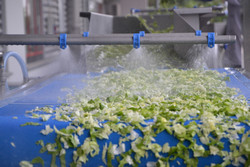RESFOOD delivers solutions for a sustainable and safe food chain
Led by project coordinator TNO in the Netherlands, RESFOOD has succeeded in developing an impressive suite of solutions and novel approaches across crop cultivation, fresh food processing and waste valorization that the team hopes will impact on the European food sector in the near future. From cutting edge techniques for microbial profiling of water to the creation of two pilot plants for fresh-cut vegetables which treat and reuse water, RESFOOD’s range of ready-to-market technological solutions, practices and strategies were presented at its recent final conference in Brussels. Closing the water cycle in horticulture and food-processing On average, 44 % of the total water abstraction in Europe is used for agriculture. Within the RESFOOD project, ICT solutions were developed to address this issue. Tested in southern Spain and presented at the conference, the team says that these solutions will make it possible to reduce the water use per ton of product in soil-based systems by over 40 %, without having an effect on the production. Additionally, at Vezet, one of the biggest fresh-cut vegetable processing companies in the Netherlands, the RESFOOD team showed that it is possible to recycle 50 % of the wash water – after treatment by UF and UV desinfection – without influencing the quality of the product. This solution was tested at full scale at a production line with different types of vegetables. Water-efficient washing machine for fresh-cut food Among the other solutions presented at the conference was the water-efficient washing machine for fresh-cut food, developed by project partner Kronen in Germany on the basis of research into decontamination strategies by CNTA in Spain. Charged with the aim of producing a mechanical washer that prioritised food safety, energy and water saving, the Kronen team researched and developed its water efficient washing machine prototype that has now been tested at VEGA MAYOR SL, a leading fresh-cut produce processor in Spain. The demonstration showed promising results - the new machine reduced water consumption from 1.8 litre/kg to 1.3 litre/kg. Eric Lefebvre from Kronen pointed to areas of future research for optimizing the prototype, ‘We now want to use the results of this innovation to save energy also on smaller washing machines. We plan to reduce the water consumption, taking the water from the outfeed belt and bringing it back into the machine. Also, we’d like to carry out tests on other products such as baby leaf and spinach.’ Optical biosensing methods for rapid monitoring of bacteria Food and water safety has been one of the focuses of RESFOOD partner Technion in Israel over the course of the project. Speaking at the conference, Prof. Ester Segal from Technion presented the new optical biosensing system for rapid and onsite detection of bacteria in water that has been developed. The prototype system has proved robust and performed well during two rounds of pilot tests, and the results of the second demonstrations are currently being processed and analysed in order to further optimise the performance of the biosensors. Prof. Segal’s team has already been contacted by different industries interested in applying these technologies. IS-Pro kit for microbial profiling of water Also exploring bacteria in water, over in the Netherlands, RESFOOD partners Microbiome developed the IS-Pro kit. Over the three years of the project, the team honed a process called IS profiling, which uses differences in DNA, analysed by polymerase chain reaction (PCR) to detect all bacteria. Speaking at the conference, Martine Bos from Microbiome noted that the team is currently working on getting the necessary certification in order for the kit, along with a portable water flitering device – also developed during the project –, to go on the market in 2016. Other RESFOOD solutions range from optimised irrigation management and improved technologies for water reuse and nutrient recovery to more environment-friendly extraction techniques of valuable materials from food by-products. Tests in real-case scenarios have been performed across the board in RESFOOD to assess the potential application of solutions for the European food industry. For further information, please visit: RESFOOD project website
Countries
Netherlands



